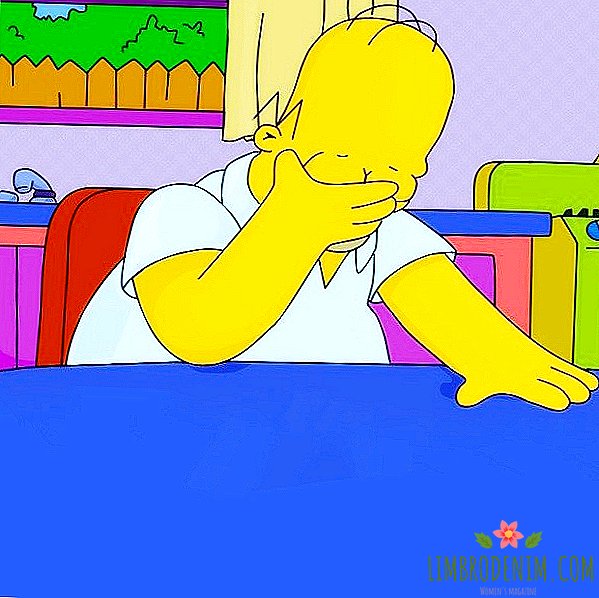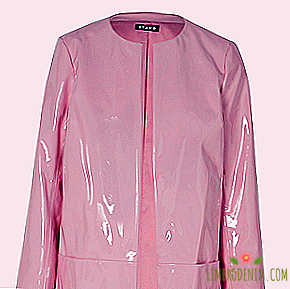"System error": As I understood that I am queer
I never wanted to be a man. And I never wanted to be a woman. Therefore, whenever I had to talk about myself (did I “read” or “read” a book? Did I “go” or “go” to a party?), I could not decide. Language is very connected with our identity. What and how we talk about ourselves determines how other people perceive us. I offered the language a choice of two options, and both of them were far from my experience and perception of myself. I need to choose once and for all the answer to the question: "Who are you? Girl or boy?" And then I found a word that helped me to call this feeling of resistance to the obligatory choice, this unwillingness to participate in the system with the two options “woman” and “man”. This word is queer.
As I understood that I am queer

Until the age of eighteen, it seemed to me that being a woman was like being in captivity. Everyone tells you what to do, nobody cares what you want, and at the same time there is a punishment system that limits your possibilities. It may not seem so important, but I spent most of my life in the firm conviction that you cannot go outside without shaving your legs, because this is shame and disgrace.
At the same time, I was constantly haunted by the feeling that when other people talk about themselves as women, they talk about some kind of experience that I don’t have. And it didn’t look like the girls around like to watch melodramas and sit by the window in the rug, and I’m not like that, I’m taller than that. I just could not understand how they manage to be in harmony with themselves. I had a battlefield every day: do I want others to perceive me as a girl, or do I want them to perceive me as a man? How do I need to get dressed? What do I need to say? How do I need to behave?
This is the problem of the binary system: if you are not a woman, you automatically become a man. I have never experienced a strong connection with the identity of a man. In general, I find many things in patriarchal masculinity unbearable: the ban on the display of emotions, the obligatory demonstration of power, and the internal permission for aggression and violence. But, since I did not feel like a woman, it seemed to me that I had only one option.
Now it seems absurd to me: there are more than two hundred public pages on feminism on the VKontakte network, and I spent almost six years studying gender theory, sociology and queer theory. But in 2011 there was nothing even remotely similar to this. I remember very clearly how a scandal erupted in my tape because of a photo where feminist and artist Zhenya Belykh did not shave her armpits.
I started to dress more feminically, started to treat myself much better and at the same time I became involved in the feminist movement online.

At first, unshaven armpits also seemed to me a slap in the face to the public taste, but I wanted to understand: why does this girl share something that will obviously cause a negative response? Zhenya then translated various texts about physicality and sexuality. For a while, I just read them. And then a post appeared that all bodies are beautiful and hair grows where they should grow, and in general, to shave or not to shave is a personal matter. In 2011, it was almost the most radical statement that I met. And when I saw this post, I was greatly relieved that in fact I could love myself, I could love my body. Hooray!
I really enjoyed not hating myself. I started to dress more feminally, started to treat myself much better and at the same time I became involved in the online feminist movement. I read more about the patriarchal system and in my second year at the university I began to do something that could be called gender studies if my university recognized gender studies. Many have told me how wrong I am, and in general, I should think about marriage, and not sit and criticize the representation of women in advertising. And for a while I was confused: if everyone says that I am wrong, maybe I am really wrong?
In the third year I was able to go to study by exchange. I had to learn the theory of media and the study of cinema, but I accidentally learned queer theory. And it turned out that all this time, while people told me that there is a given order of things, where women do one job, and there is no other man and people with different identities, they were mistaken.
The most dangerous word

The concept of "queer" does not have a precise definition. In the Russian-speaking space, this term means immediately both a social phenomenon, and a political position, and identity. And that is how I like it so much. Initially, the word "queer" was used as a curse word, but in the late eighties, as civic activism grew, the LGBT + community rethought and appropriated it. Instead of “strange, other,” queer has come to mean conscious belonging to LGBT +. A little later, all the same people who walked the streets with banners, brought the word "queer" to academic audiences and began to engage in gender studies. But, since in the post-Soviet space neither gender studies nor the study of LGBT + communities became part of everyday life, the queer had to understand to the best of its ability.
The most common use of the word "queer" in the Russian-speaking environment is a synonym for "LGBT +". Not "LGBT-festival", but "queer-festival". Not a lesbian film, but a queer film. LGBT + groups are discriminated by the state, people around them react sharply to words like "gay", "lesbian", "transgender". The word "queer" - incomprehensible and unknown to anyone - became a kind of shield, a magical pass to the world of permitted festivals, exhibitions and lectures.
The second meaning of the word "queer" is identity. Both gender and sexual identities are described to them. If someone does not want or is not sure how to call himself, he can say "queer." Queer can also be a conscious gender search strategy: queer people can play different gender roles. In this sense, queer is closer to the concepts of non-binarity (that is, avoiding defining oneself only as a woman or as a man) and non-conformity.
The radical meaning of the word "queer" is a political statement. This is how I use it. It involves the adjustment of existing norms and regulations, the rejection of the need to identify ourselves, an intentional criticism of how we are accustomed to define ourselves. Queer makes it possible to secure some groups and at the same time politicize other groups. And therefore queer is the most dangerous word of all that we have.
Simple things

Judith Butler, a key Queer researcher, has an interesting idea that gender as a system and our gender identity as part of this system is a performance, a constant theatrical practice of creating "us." If we want other people to accept, understand us and not apply sanctions against us, we play our identity according to the rules of this system. For example, we participate in conversations about marriage and pregnancy, we condemn other women for their figure, make-up, style of clothes.
But if we feel that such a view does not correspond to our perception of ourselves, we can build our performance differently. We can do small interventions: where you need to remain silent for a sexist joke, cut off the prankster; where you need to emotionally serve someone, refuse to do it. But besides that, we can radicalize our performance. We can refuse to play. Go on stage and say: "I'm sick of it all." For me, this is queer.
I use the term "queer" in relation to myself for about three years. First of all, building up the existing gender system with the coordinates "woman / feminine" and "male / masculine". I do not want to define my identity in this framework, I do not want to look for it in this spectrum. I want to live my experience without reference to these categories, without searching for words and terms for how I feel. I use the name "Tony", which is read as gender neutral and gives me the opportunity to painlessly communicate with others: when your name cannot be inclined, many things become easier.
When I say that I define myself as queer, I mean that I hope for the future, where there are no gender categories, where inequality and violence are no longer oppressive mechanisms

From the gender system, I build up through the language and use the masculine gender when I talk about myself. I tried to move both to the neuter gender and the plural, but, unfortunately, the neuter gender is perceived as a kind of objects, not living people. For me, feminism did one very important thing: it returned the value to the feminine and destroyed the order, where the "male" is the universal one to which one should strive. Therefore, I wear skirts, dresses, sometimes I paint very brightly. I do not want to run away from the feminine, I do not want to run away from the identity of "woman." But for me it is important to create a gap between identities and leave room for doubt, using the way I look and the way I say.
This is my strategy. I know other people who work through expression: they create images where gender cannot be considered, or, on the contrary, play with norms. Queer as a practice is very diverse.
Queer is a utopian project. When I say that I define myself as a queer, I mean that I hope for the future, where there are no gender categories, where inequality and violence are no longer oppressive mechanisms. But while I hope for such a future, I accept a world where there is gender, and I participate in projects that help real women, LGBT + and other non-binary people to change the world here and now. Now I live in Sweden, where I work in a human rights organization, and my area is the rights of women and LGBT + in Eastern Europe. In addition, I have a blog and a public page where I talk about feminism and gender studies, and I teach people at various courses and events what queer theory is, postcolonial studies, feminity and other interesting things.
Non-binary people often fall into the exception trap. I am faced with the fact that in the feminist community and in the LGBT + movement there is a certain hierarchy of problem solving. We will first solve the issues of domestic violence against women, and then we will deal with domestic violence against non-binary people. First we will get LGBT rights, and then all the rest. In my opinion, this is an extremely unproductive model that separates movement, makes one group more worthy of attention and resources than the other. The problems that non-binary people face are the same problems that vulnerable groups face in the patriarchal system, therefore, solving them together can achieve a greater effect.
"Why queer, and not a strong woman?"

For me it is important to highlight system errors and engage people in the dialogue. For example, I often participate in public events, where I talk about myself as a man. People react differently. I know that when people see me, they put me in a "woman" box. Then I begin to speak - and the box falls apart. The gender system did not work, what's the matter? Sometimes people come up to me after events and ask why I say this about myself, if I feel like a man. I ask the answer questions: why did this person have a feeling of anxiety because of the discrepancy between my appearance and my speech? Can men wear dresses and cosmetics? Can women talk about themselves in the masculine? Who are non-binary people? Very often, such conversations end productively, and people then write and ask about additional articles and books on some topics.
There is also another reaction: people, as it were, do not pay attention to my presentation in the masculine gender. They pretend to have misheard, continue to talk about me in the feminine gender, deliberately build oppositions like "I am a man, and this is a woman." It is always interesting to me to understand what it is connected with. Sometimes I get very aggressive answers, sometimes people themselves do not understand what worries them. It is uncomfortable for people to think that perhaps the usual order of things needs to be changed.
Some of my friends were interested in what I was doing. With some, we spent a lot of time in debates and discussions. With others it was easier to stop communicating. One girl, with whom we were best friends, wrote to me on my birthday for several years in a row that one day I would meet my female happiness and be able to escape from feminism. It seems to me important to explain the value of equality, diversity and freedom of choice to people who are far from feminism, but sometimes there is no strength left for it.
Queer addresses the binary problem and asks a tricky question: what is a woman and a man at all? How do we define it?

I have a couple of friends of profeminists, we have known one of them for almost twelve years. Together with them, we did a joint video project dedicated to physicality and practices of gender marking of the body, and talked a lot about male physicality and sexuality. In friendship, I am not looking for unconditional acceptance - I am looking for opportunities to move on and help each other develop.
Queer addresses the binary problem and asks a tricky question: what is a woman and a man at all? How do we define it? Do we all equally understand these categories? Now you can see the reaction to such questions, which is expressed in the constant multiplication of identities. I remember how in 2014, a sign with gender identities, where there were fifteen different terms, was in great demand. Today there are at least thirty different names on such a tablet. This is not the pernicious influence of Tumblr, not the zombies of people with queer theory, not the irrational desire to stand out in a crowd. Just the categories of "woman" and "man" cease to be meaningful to people. People do not see the value in the prescriptions laid down in these roles, and therefore they are trying to find words that will grasp their experience. And for many, this is a very big alarm situation. I sometimes write threatening letters, but this is part of publicity.
I still find myself in situations where people use the feminine in relation to me in order to humiliate, deprive me of expertise or put me in a vulnerable position. "Girl", "sweetheart", "my dear" - for me to be called a woman is not a humiliation. Therefore, I sometimes “take away” this identity and act upon it if I consider it possible.
Everything flows, everything changes

I started talking about myself in the masculine about seven years ago, and now I feel that this method is losing its appeal to me. This is largely due to the fact that lately I have been working a lot with language, with the problem of using "masculine" as a universal language, and it is becoming more and more difficult for me to find myself in the masculine gender. In addition, I spent more than a year speaking exclusively in English (for rare cases), and this experience of living in a language where you don’t need to define yourself at all, because there is no grammatical gender, opened for me some new ideas for presenting .
I see great potential in using gender-gaps (using underscores to include non-binary identities, such as teacher_nitsya, banker_sha) and initiatives to neutralize the language. For me, identity is changeable and plastic. We all live a lot of experiences, each of which is unique. I am confident that as social roles change, women's empowerment, recognition of trans * and non-binary people’s experience, the number of words to describe our identities will increase. Until one day the moment comes when we no longer need these words.





